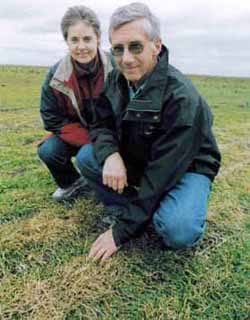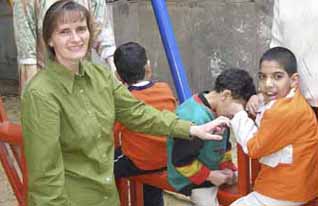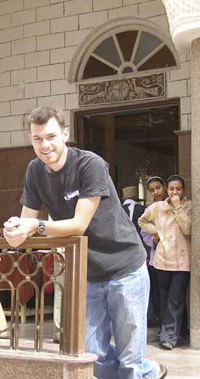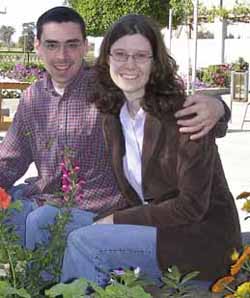Canadian Mennonite
Volume 10, No. 16
August 21, 2006

Sowing seeds, harvesting faith
La Salle, Man.
 |
In the manner of farmers everywhere, Ernie Wiens carefully sows his seeds each year, and then works diligently towards reaping their eventual harvest. And in more than 30 years of working the soil near Glenlea, Man., he and wife Charlotte have enjoyed their share of plentiful harvests.
But unlike most farmers, Wiens has also been sowing seeds of a more sacred nature, and equally reaping spiritual fruit. That’s because he combines farming with part-time lay ministry at the nearby Glenlea Mennonite Church.
The Wiens didn’t set out down these dual paths. Sure, Ernie grew up on a farm and studied agriculture, but after finishing university in 1967, he fell into teaching at Mennonite Collegiate Institute in Gretna, Man. Then, after he and Charlotte were married, they volunteered in Botswana with Mennonite Central Committee (MCC). She worked as a nurse, he as a teacher. And they loved it.
But when word came that Ernie’s father, who farmed with Ernie’s brother, was stepping back from the operation, they decided their next move would be to the farm. “With my dad pulling out, it was a bit much for my brother,” Ernie says. “I kind of dragged Charlotte to Africa and then had to drag her home.” They moved onto the farmyard, shared with Ernie’s brother Ed and his wife Trudy, and joined forces on the dairy and grain operation. That was in 1975.
Ed’s son Reg eventually took on the dairy himself, but they farm the land as a threesome, growing a mix of cereals, oilseeds and pulses. They have 1,035 hectares in total, with Ernie’s share around 405 hectares.
Meanwhile, just as Ernie was fully immersed in farm life, the church began to call. Members saw in him “preacher material.” He wasn’t so sure, but eventually he agreed and was ordained in 1987.
Keeping the farm tended and the congregation nourished has taken dedicated balancing—and long hours.
“I certainly feel the conflict sometimes when it’s the busy time on the farm, and there are church responsibilities,” he admits.
Ernie says it is possible to combine ministry work with farming because he shares the church work with two other people. That generally leaves him preaching every third Sunday, while also doing some teaching and leading Bible studies. It helps that many of the 140 church members are also farmers.
“Historically, the church has always been gracious,” Ernie says.
Charlotte has taken it all in stride. “It’s been okay because my father was also a pastor. This wasn’t totally new to me,” she says.
But as they head towards the end of active farming—Ernie is 58, Charlotte, 56—they are starting to re-evaluate their farm lives. Although they’ve made a good living, too many wet years have taken their toll. Last year, they managed to seed only two-thirds of their cropland, and only harvested about half of that.
Meanwhile, their three children show no signs of taking over the farm, although eldest son—Matthew, 31—actually has a master’s degree in agriculture. But his focus is organic farming. He and some friends recently bought land to set up a community organic farm.
“He challenges me on our farming practices,” says Ernie.
With ever-rising input prices, Ernie can see the allure, although he isn’t convinced organic farming can work well in Manitoba. Still, when asked what they’ll do in retirement, Charlotte laughs. “Maybe join Matthew,” she says.
They are also drawn towards Africa again.
They have always chosen to seed their lives with rich experiences, whether in Canada or abroad. For three years in the ’80s, Ernie worked in the overseas office at MCC in Winnipeg, while farming evenings and weekends. Some years, they hosted international students from Finland on the farm. And Ernie also helps with an annual growing project for the Canadian Foodgrains Bank.
What energizes him particularly is chairing an inter-church committee that brings together different denominations for common worship and fellowship. Called the Meridian Inter-church Committee, it includes representatives from four Mennonite, three Catholic, three United Church and two Lutheran congregations.
“There’s so much fragmentation in our world all around us and it’s so vital that we come together, rather than drift apart,” explains Ernie.
“Some of my best ‘God moments’ have been by myself out on the field enjoying God’s creation,” Ernie says. “There’s nothing I like more than being out on the Prairie on a nice day, swathing a field.” He sees it as being an integral part of God’s creation, as “being co-creator with him.”
Healing and teaching in the land of the Sphinx
Egypt
 |
Gloria Dueck
In many impoverished communities in and around the capital city of Cairo, children born with physical and mental disabilities face a bleak future. Which is why the work of Gloria Dueck, an occupational therapist from Arborg, Man., is so important.
Specializing in children’s developmental needs, Dueck works with children, teachers and parents in the Seeds of Hope School—a school for 70 children living with all levels and types of disabilities run by the Egyptian Coptic Orthodox Church.
“There are so many needs. The whole environment in Egypt is not geared for people with disabilities,” explains Dueck, whose service term ends in May.
To ensure that teachers will have ongoing access to information on issues pertaining to child development and disabilities, Dueck spends her evenings developing a written curriculum for use as a training resource when she leaves.
Dueck is also leaving another legacy. Shortly after beginning her placement, she realized she could contribute to the children’s nutritional needs through providing milk for a weekly meal. When her sister, Rose Dueck, heard about the need for milk, she raised enough money so that the children could have milk every day. This project has now expanded to a broader relief effort, with MCC providing milk grants of $1,650 to the Seeds of Hope School’s Kindergarten and pre-school programs.
 |
Nelson Heppner
“I live on the Nile. I see it every day—it’s mind boggling,” exclaims Nelson Heppner, a Canadian working in Egypt under MCC’s one-year SALT (Serving and Learning Together) program for young adults.
Living on the banks of this historic river, and meeting people whose ancestral roots in Egypt date back thousands of years, has ignited his interest to learn more about the country’s history, religions and cultures. “It’s a completely different world,” says Heppner, noting that anything older than 100 years is considered historic in his hometown of Steinbach, Man. “The 80-year old tractor at the Mennonite Heritage Village seems rather insignificant in comparison to Egypt’s history.”
Heppner lives in Upper Egypt (the southern part of the country) at a Coptic Orthodox Church retreat centre across the river from Beni Suef, a provincial capital of about 200,000 people, 120 kilometres south of Cairo. He assists teachers in the English program at the church’s elementary school in New Beni Suef, a new planned city across the Nile River. He also teaches English to adults three evenings a week.
Living in Egypt reminds him of biblical stories relating to Egypt. One of the most significant events that continues to be celebrated there is recorded in the New Testament—Mary and Joseph’s flight to Egypt when Jesus was an infant. Although Beni Suef is not an official site on the map that traces the route of the Holy Family, the church has sacred landmarks in the region to commemorate the journey.
Heppner’s one-year term ends in July.
 |
Sandy and Barrette Wiebe Plett
Sandy and Barrette Wiebe Plett, both originally from Winkler, Man., started a three-year placement with MCC last November to train English teachers in Egypt. “The catalyst was the tsunami. It forced us to turn our thoughts to the wider world,” says Barrette, who left his teaching position at Winnipeg Mennonite Elementary School to work in Egypt. Sandy served as the director of summer camps and youth ministries for Mennonite Church Manitoba prior to their departure to Egypt.
The Pletts live in Assiut, a city of about 400,000 in the Nile Valley, about 300 kilometres south of Cairo. They spend their time with English teachers in classroom settings and share ideas on teaching techniques.
The long-term goal is to start a training centre for teachers working in the nine schools run by the Synod of the Nile Presbyterian Church in Upper Egypt.
School supplies and teaching resources are inadequate, says Barrette. Teachers don’t have the time or incentive to plan because they teach different classes on a regular basis and provide private tutoring services in the evenings to help children pass their exams.
“Teachers are unbelievably warm and open to our suggestions,” says Sandy. “We only suggest things that we think could be possible for teaching under these circumstances.”
MCC currently has 15 service workers and staff in Egypt, a country of 76 million.
Cambodian refugee finds joy in serving
Thirty-six-year-old Siyano Prach, a Cambodian-born Mennonite Disaster Service (MDS) volunteer, spent his youth in refugee camps after fleeing Pol Pot’s killing fields. The experience left a deep impression on his life, so much so that he has committed himself to doing what he can to improve the lot of his people.
Prach, a long-term volunteer for three months, works as a labourer and construction helper at the newly designed elevated panel houses MDS is erecting along the Pointe Aux Chenes bayou on the Louisiana Gulf Coast.
Site foreman Carl Grimson, a retired millwright from Montana, is impressed by Prach. “He learns by watching and sees what needs to be done and then does it. He’s a good worker,” says Grimson.
What is not apparent from watching Prach work is his deep-seated motivation. “I want to do whatever I can to help—to live life to the fullest by giving to others,” says Prach. “I want to learn how to start an organization and be a proper director. I want to help people to do what they can. Right now, I am learning the ropes.”
Under the brutal rule of Pol Pot, leader of the Khmer Rouge, about 1.7 million Cambodians died from starvation, overwork, torture and execution in less than four years. Prach’s family had their house taken away by the regime and then were moved from the city to a rural area. They moved from place to place, trying to stay one step beyond the reach of the Khmer Rouge.
When he was 12, Prach remembers his father asking him and his two brothers if they wanted to go west. Not realizing that this meant a separation from his family, Prach agreed. Through his tears the father said Buddhist blessings on them and sent them on their way to the border with Thailand.
That was the beginning of his youth, which included being robbed, beaten and abused, all the while longing for home. But into his darkness shone a beam of light. He met some Christians in the one of the camps. In his loneliness they made him feel welcome and loved. As a result, he accepted Christ and was baptized.
The three brothers spent 18 months in Khao-I-Dang Refugee Camp before being offered refugee status and being allowed to come to Canada. The brothers arrived in Winnipeg in November 1984, but eventually migrated to Quebec, where an uncle had a restaurant. Prach worked there, learned English and worked at finishing his high school and post-secondary schooling at Concordia University.
He became a substance abuse counsellor, but after awhile was disillusioned by people who were dissatisfied despite having so much. Now he is working with an opinion research company doing surveys. He says he is fortunate that his employer understood his desire to help others and gave him the time off to volunteer in Louisiana.
“Through it all I always felt blessed,” he says. “I did not compare myself to those who have plenty, but to those who are still in Cambodia struggling.”
Prach first heard about MDS in Montreal, where he attended an Anglican church. Just after the 2005 hurricanes in the Gulf Coast, a church member shared a slideshow about her experience with MDS in Wauchula, Fla.
“Wow, that’s what I would like to do,” thought Prach. “I can’t just sit by and watch it on TV. I am impressed with MDS—it shows a different aspect of wealth.”